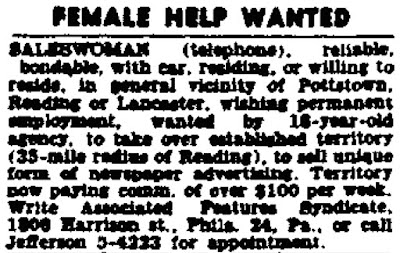Wednesday, September 27, 2017
Ink-Slinger Profiles by Alex Jay: Associated Features Syndicate
The Associated Features Syndicate was started in 1932. The Lebanon Daily News (Pennsylvania), July 22, 1954, published an obituary for S. Fayette Cartledge and said “Cartledge had been with National News Service and was a partner in Associated Features Syndicate from 1932 until he established his own publicity agency five years ago, serving community weekly newspapers.” In a classified advertisement in the Trenton Evening Times, November 17, 1950, Associated Features Syndicate described itself as an “18 year old agency”.
Field Guide to Wild American Pulp Artists said Robert W. Farrell “owned and operated Association Feature Syndicate [sic]”. It’s not known who the other Associated Features Syndicate partners were and their percentage of ownership. Associated Features Syndicate was based in Philadelphia with offices in other cities. Farrell was a New York City representative in the Woolworth Building office.
A forthcoming Associated Features Syndicate column was noted by the Cleveland Plain Dealer (Ohio), January 28, 1935.
Huey is now taking up journalism as a means of reaching out with his economic and political ideas. The Associated Features Syndicate advertising in Editor and Publisher that Long will write a daily 100-word article a la Will Rogers, commenting on “vital affairs, social, economic and political.” It will be headed: “Huey Long Says.”Long died September 10, 1935.
The New York Post published a series of articles about Long. The fourth chapter appeared September 13, 1935 and said
…Senator Long, as recently as the early spring of this year, made arrangements with Robert W. Farrel [sic], a young syndicate manager with offices in the Woolworth Building, for the marketing of a daily feature—a brief bit of personal, informally written comment, somewhat in the style of the late Will Rogers.An entry in the Catalog of Copyright Entries, Part 1, Group 2, Pamphlets, Etc., 1938, New Series, Volume 35, Number 2, showed Associated Features Syndicate had an office in New Brunswick, New Jersey.
Long wrote a number of sample columns, and plans were made to open an intensive nation-wide sales drive in the beginning of next year.
Mr. Farrel, who disclosed these facts to the Post, said he was so certain of the enormous success awaiting the venture that, to protect his interests, he signed a six-rear contract with the Senator.
The syndicate manager’s extreme confidence in the profitable outcome of the enterprise further prompted him to apply to one of the great insurance companies for a policy on Senator Long’s life.
It was his intention to take out $100,000 on the Kingfish with himself as the beneficiary in order to offset the heavy losses which, he felt, he would suffer in the event of the Senator’s death.
In light of Long’s violent end, these insurance negotiations had in them a quality of dire prophecy.
Officials of the company, Mr. Farrel said, informed him that the premium could not be determined on the usual basis of age, health, occupation. In Long’s case, they told him, a special study of the facts by the company’s actuaries was required.
Mr. Farrel was finally notified that the annual cost of the $100,000 policy would be $10,000—a 10 per cent premium.
Astonished, he demanded to know the reason.
“Our actuaries,” the insurance men told him, “consider Huey Long an extremely hazardous risk.”
The New Brunswick Home News newspaper published Jack Kirby's Lightnin’ and the Lone Rider. The strip was conceived by Farrell, also the writer, as a Lone Ranger imitation. A promotional advertisement ran November 16, 1938. Promotional strips ran beginning January 3, 1939. Lightnin’ and the Lone Rider debuted January 9. Kirby’s last strip appeared February 18. The strip resumed two days later with art by Frank Robbins. His run ended April 22. The strips were reprinted in the Famous Funnies comic book series.
Another Associated Features Syndicate imitation was Fu Ling Pu, a comic panel similar to Stanley Link’s Ching Chow that was created by Sidney Smith. Fu Ling Pu was written by George Ebbert and drawn by Gill Fox. Apparently, the series was never sold; samples can be viewed here.
In 1938 Associated Features Syndicate copyrighted Little Ezra by Ed Jona. It’s not known if the series was ever published.
Julian Ollendorff’s Olly of the Movies moved in 1937 from the “McNaught Syndicate to the less prestigious Consolidated News Features….Things really hit rock bottom a year later, when the strip was picked up by hole-in-the-wall outfit Associated Features.”
Associated Features Syndicate provided images of U.S. Army Air Corp and Navy planes for the full-page Comicscope advertisement that appeared in comic books such as Yankee Comics #1, September 1941 and Our Flag Comics #2, October 1941. The patent for the projector was held by Victor S. Fox and Farrell. (The Comicscope and Simon and Kirby’s Captain America crossed paths here. Kirby’s Lightnin’ and the Lone Rider was seen in the Televiewer/Movieviewer.)
Associated Features Syndicate moved its New York City office at least three times after its Woolworth Building location. Classified Lists (1939) listed Associated Features Syndicate at the Times Building. A 1941 issue of Writer’s Monthly had this listing: “Associated Features Syndicate, Times Bldg., New York City. Ed., Robert W. Farrell. Feature articles, comic strips, humor columns, and editorial material. Pay on royalty basis.” A 1942 issue of The Writer said Associated Features Syndicate was at 1776 Broadway. In a 1944 issue of Writer’s Monthly, Associated Features Syndicate’s address was 28 East 10th Street.
Associated Features Syndicate’s main office was in Philadelphia at 1806 Harrison Street, and, from time to time, it advertised for help in the Philadelphia Inquirer.
1/22/1937
2/11/1940; aforementioned Cartledge was an editor
9/2/1950
4/8/1951
At some point Associated Features Syndicate ceased operations.
—Alex Jay
Labels: Ink-Slinger Profiles




